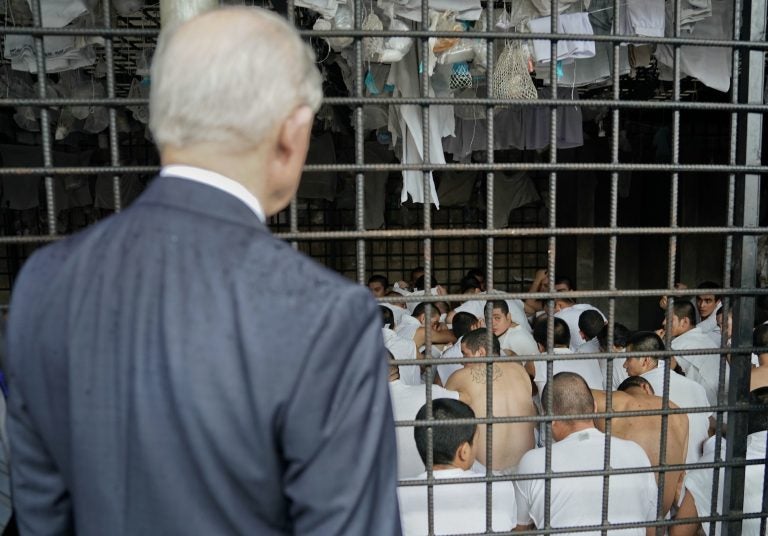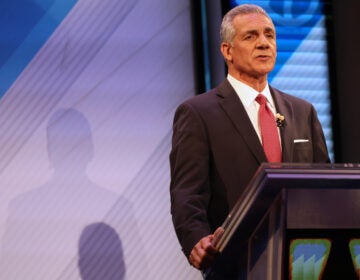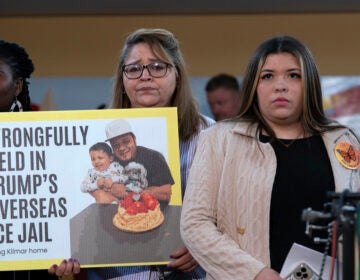Thousands in N.J. face deportation should temporary protection end for Salvadorans
A quarter-million Salvadorans in the U.S., could be deported if the Trump administration ends the protection known as TPS.

U.S. Attorney General Jeff Sessions stops to look at cell conditions during a tour of a police station and detention center in San Salvador, El Salvador, in July. The city is known as one of the most dangerous in the world. The Trump administration is expected to decide Monday whether to extend temporary protected status to 250,000 Salvadorans in the U.S. (AP Photo/Pablo Martinez Monsivais)
Update: The Trump administration said Monday it is ending special protections for Salvadoran immigrants, an action that could force nearly 200,000 to leave the U.S. by September 2019 or face deportation. Hugo Martinez, El Salvador’s foreign minister, says this action underscores the need for legislation that would let them stay. He says he is confident that Congress will develop a permanent fix.
—
Monday is the deadline for the Trump administration to decide whether to extend protection from deportation for more than a quarter-million people from El Salvador in the U.S.
Locally, 6,800 New Jersey residents from El Salvador have “temporary protected status,” or TPS, a humanitarian benefit extended to citizens of countries deemed temporarily too unsafe for them to return, according to the Center for Migration Studies. Estimates for the number of beneficiaries in Delaware and Pennsylvania fall below 1,000.
The U.S., which initially granted Salvadorans temporary protected status following two major earthquakes in 2001, continued to renew the protection every 18 months since the original designation. Top officials in the Trump administration have criticized these renewals, including former Homeland Security Secretary John Kelly, saying they violate the temporary nature of the law and create a kind of de facto permanent residency for TPS beneficiaries.
“By definition, it’s meant to be temporary, it’s focused on a single event,” said Kelly, who is now Trump’s chief of staff, last year. “It’s not meant to be forever, unless Congress changes the law.”
Temporary protected status keeps people who came to the U.S. illegally — or who happened to be here legally during a cataclysmic event such as a natural disaster or civil war — from being forcibly returned to unsafe conditions.
Only Salvadorans who were in the U.S. when earthquakes struck their home country, and who have lived here continuously since then, qualify for the TPS. It does not allow recipients to transition to legal permanent residency, but many TPS holders put down roots — starting businesses, owning homes and having children who are U.S. citizens.
“The situations that they’ve come from aren’t necessarily resolved. And, in some places, people, especially kids, [are] going back to places they’ve had no experience with,” said the Rev. Sandra Strauss, director of advocacy and ecumenical outreach for the Pennsylvania Council of Churches. The council is one of many religious advocacy groups that have asked U.S. officials to extend the protection for Salvadorans, who make up the largest country cohort of beneficiaries. The U.S. Conference of Catholic Bishops is another.
On Jan. 3, 19 mayors from the group Cities for Action — including Allentown mayor Ed Pawlowski — urged extending the protection in a letter to U.S. Department of Homeland Security Secretary Kirstjen Nielsen. Their concerns ranged from harm to U.S. citizen children to lost economic contributions made by TPS holders.
The letter also addressed the situation deported Salvadorans would find on their return. “Congress created TPS for circumstances in which a country’s conditions are too dangerous to permit the safe return of a group of nationals, and El Salvador is a textbook example of such conditions,” wrote the group.
Those conditions now include widespread gang violence, one cause of continued migration from El Salvador to the United States. El Salvador’s capital, San Salvador, has a high murder rate and is routinely is listed as one of the most dangerous cities in the world.
“There is an exodus, particularly of mothers and children,” said Ana Maria de Keene, El Salvador’s honorary consul in Philadelphia. De Keene said she hoped the U.S. will offer another 18-month extension to the program.
“This status puts people in limbo, but at least it gives them a bit more time,” she said.
Temporary protected status for Salvadorans currently runs to March 9, but Monday is the deadline to extend it.
—
The Associated Press contributed to this report.
WHYY is your source for fact-based, in-depth journalism and information. As a nonprofit organization, we rely on financial support from readers like you. Please give today.




